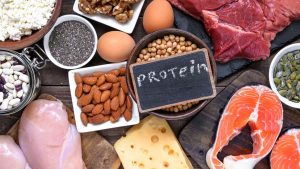
How Much Daily Protein Do You Actually Require? Explore These Guidelines for Success
Protein is an essential nutrient that plays a vital role in many bodily functions, including muscle growth and repair, bone health, and immune function. While most people are aware that protein is important, many people are unsure of how much protein they actually need each day.
The Recommended Dietary Allowance (RDA) for protein is 0.8 grams per kilogram of body weight. This means that a 150-pound woman would need about 54 grams of protein per day, and a 200-pound man would need about 70 grams of protein per day.
However, the RDA is just the minimum amount of protein that you need to prevent deficiency. If you are active, pregnant, breastfeeding, or recovering from an illness, you may need more protein.
Here are some guidelines for success when determining your daily protein needs:
- Consider your activity level. Active people need more protein than sedentary people. For example, a person who lifts weights regularly may need 1.2-1.7 grams of protein per kilogram of body weight per day.
- Take your age into account. Older adults may need more protein than younger adults to maintain muscle mass and bone health.
- Listen to your body. If you are feeling tired, weak, or sore, you may not be getting enough protein.
Here are some simple and easy ways to increase your protein intake:
- Eat lean protein sources at every meal. Good sources of lean protein include chicken, fish, beans, lentils, tofu, and eggs.
- Add nuts and seeds to your meals and snacks. Nuts and seeds are a good source of protein and healthy fats.
- Choose protein-rich yogurt and cottage cheese. Yogurt and cottage cheese are a good source of protein and calcium.
- Use protein powder in smoothies, shakes, and oatmeal. Protein powder is a convenient way to add extra protein to your diet.
If you are unsure how much protein you need or how to meet your protein needs, talk to your doctor or a registered dietitian. They can help you create a personalized plan that meets your individual needs.
Here is a unique tip for increasing your protein intake:
- Try eating fermented foods. Fermented foods, such as yogurt, kefir, kimchi, and sauerkraut, contain probiotics, which are beneficial bacteria that can help improve digestion and nutrient absorption. Probiotics can also help increase protein synthesis.
By following these guidelines, you can ensure that you are getting enough protein to support your overall health and well-being.
